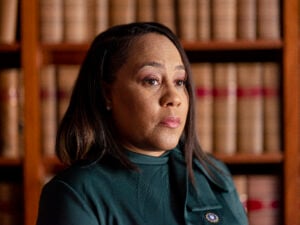Fulton DA Slaps Back At Clark And Meadows Claims That Overturning Elections Was Their 'Job'
Smile for the camera, boys.

Fani Willis, the District Attorney of Fulton County, Georgia (Photo by David Walter Banks/Getty Images)
It’s going to be a wild day in Atlanta, with Donald Trump set to turn himself in this afternoon after being indicted with 18 of his pals as part of a sprawling RICO conspiracy to overturn the results of the 2020 presidential election. But over at the Richard Russell Courthouse, things are also hoppin’ as three of Trump’s co-defendants seek refuge in the warm embrace of the Northern District of Georgia.
Earlier this week, former DOJ environmental lawyer Jeff Clark busted in like the Kool-Aid Man demanding that Judge Steve Jones immediately enjoin Fulton County District Attorney Fani Willis from arresting him for doing his “job.” Not to be outdone, former Georgia GOP chair David Shaffer moved to remove his case to federal court on the theory that being a fake elector made him a federal official. And then Mark Meadows, who moved to remove and dismiss his own indictment before the ink was even dry, demanded his own emergency order blocking his arrest — presumably on the theory that, with Clark and Shaffer on the loose in the courthouse, anything he filed would look sane by comparison.

Diving Into Generative AI: A Practical Guide For Law Firms Starting From Scratch
In the event, Judge Jones declined to issue ex parte relief, instead inviting the DA to respond to Meadows and Clark. And respond, she did!
Meadows argued that he was just doing his job as White House chief of staff when he pressured state officials to overturn Biden’s win, or in the alternative that he was engaged in political speech, which is core First Amendment activity. In a blistering response, Willis’s office noted that, not only was it not part of Meadows’s job to police the outcome of state elections, it was, in fact, illegal for him to do so under the Hatch Act.
In his Notice, the defendant makes no mention of the fact that every single one of the activities giving rise to his indictment constitutes impermissible political activity which a Chief of Staff may not lawfully perform “under color of office.” As noted above, federal law forbids any employee of the executive branch from “us[ing] his official authority or influence for the purpose of interfering with or affecting the result of an election.” 5 U.S.C. § 7323(a)(1). Federal employees are expressly prohibited from using their official title or position while participating in political activity, which is defined as activity directed toward the success or failure of a political party, partisan political group, or candidate for partisan political office. 5 C.F.R. § 734.101.
This is precisely what the defendant is charged with doing, and he does not dispute it.
She then attached a report from the Office of Special Counsel documenting the myriad violations of the Hatch Act by members of the Trump administration, including Meadows. She also included multiple transcripts of January 6 depositions showing that the meetings and calls Meadows called official business were in fact focused on the singular goal of keeping Trump in office.
Sponsored

Law Firms Now Have A Choice In Their Document Comparison Software

Diving Into Generative AI: A Practical Guide For Law Firms Starting From Scratch

Gain An Instant Understanding Of New Complaints With LexisNexis Snapshot

Law Firms Now Have A Choice In Their Document Comparison Software
Moreover, if Meadows was engaged in political speech, it was definitionally not part of his official duties, and so removal is improper.
As to Clark, the prosecutor was even more scathing, calling out his “apparent misread of the applicable statutes, a misapprehension of the binding caselaw, and a fundamental misunderstanding of criminal procedure—both state and federal.” In his motion, Clark demanded that the court consider his petition under 28 USC § 1446, the law governing civil removals, which automatically halts all state proceedings.
“The theory the defendant advances could charitably be characterized as unusual,” prosecutors wrote, noting that “the defendant has not directed this Court’s attention to any statute, case law, or other authority for his ‘civil-criminal hybrid’ theory of the criminal charges pending against him.”
Similarly, there is no emergency here justifying extraordinary relief, aside from Clark’s “displeasure at the prospect of inconvenient travel and a desire not to spend any time at the Fulton County jail — a non-particularized harm and insufficient basis to deviate from the procedure outline by statute.”
Meanwhile a consortium of conservative eminences grises docketed an amicus brief in support of remand. The group, which included Judge Michael Luttig and former Massachusetts Gov. William Weld, wrote:
Sponsored

Why Do AI And Legal Professionals Make The Perfect Partnership?


AI’s Impact On Law Firms Of Every Size

Finally, the purpose of the federal-officer removal statute—to protect federal operations by preventing retribution in state court for locally unpopular exercises of federal authority—would not be served by removal here. To the contrary, removal would be perverse, as this prosecution arises from interference with state-government operations and seeks to vindicate Georgia’s voice in a federal election, the very contest from which federal authority flows.
The amici did not mention Shaffer’s motion for removal, which was apparently too ridiculous to merit notice.
The court agreed with the state on both emergency motions, swiftly denying the Clark and Meadows petitions to evade arrest in Atlanta. Meadows’s removal hearing is Monday morning. But before that, he and Clark have to get themselves down to Atlanta and pony up for bail. Maybe they can hit up Rudy — he knows a guy …
State of Georgia v. Meadows [Docket via Court Listener]
State of Georgia v. Clark [Docket via Court Listener]
State of Georgia v. Shafer [Docket via Court Listener]
Liz Dye lives in Baltimore where she writes about law and politics and appears on the Opening Arguments podcast.







